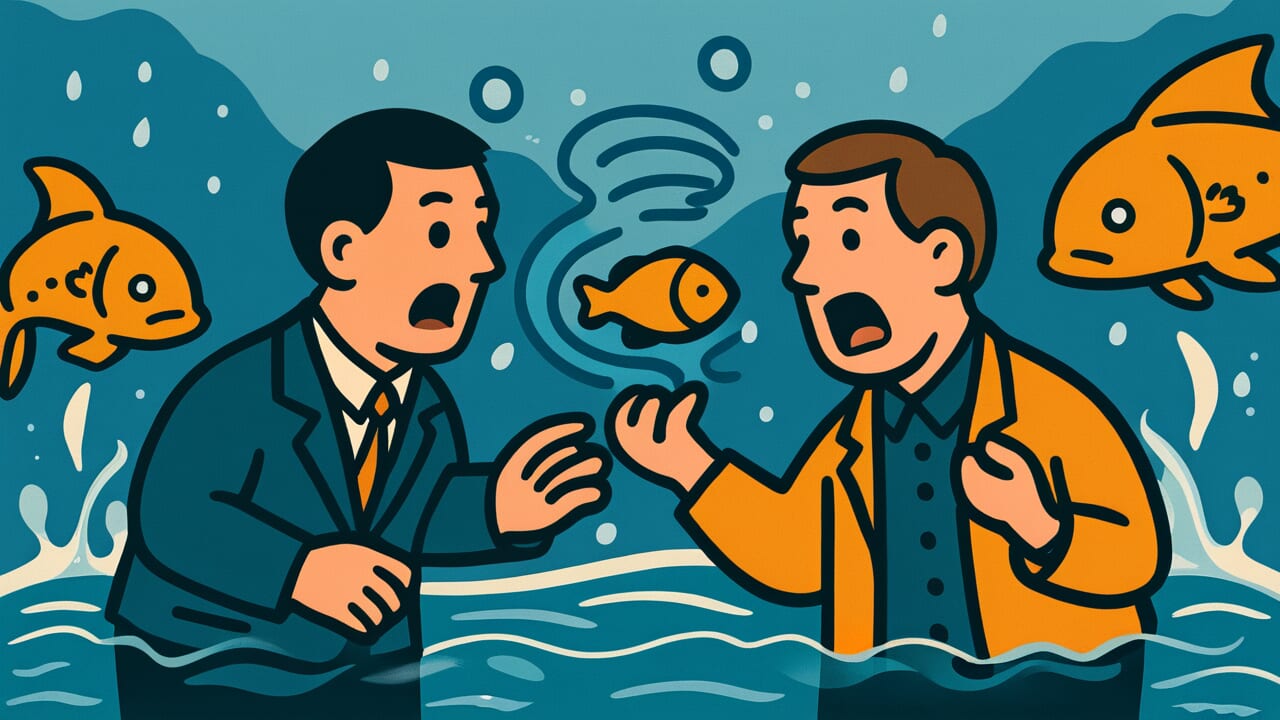How to Read “Those who fight over fish get wet”
Uo wo arasou mono wa nuru
Meaning of “Those who fight over fish get wet”
“Those who fight over fish get wet” is a proverb that warns us about the dangers of fighting over profits or benefits.
When people compete for something valuable, they often end up harming themselves in the process. Just as fighting over fish means getting wet, struggling to gain something often brings unexpected losses.
This proverb is used when someone is about to join a conflict over immediate gains. It reminds them to stay calm and think carefully.
The saying suggests that participating in a fight is already the beginning of loss. Whether you win or lose, you pay a price the moment you enter the conflict.
This wisdom still applies today in business competition and personal conflicts. It reminds us that what we lose by fighting might be greater than what we gain.
Origin and Etymology
There are no clear historical records showing when this proverb first appeared. However, the structure of the phrase reveals interesting background information.
The expression “fight over fish” is deeply connected to Japan’s fishing culture. When multiple people tried to catch the same fish in rivers or seas, they inevitably got wet from water or splashes.
This concrete experience evolved into a metaphorical lesson about life.
The word “nuru” (an old form of “get wet”) is particularly noteworthy. This archaic expression suggests the proverb has been passed down for many generations.
Getting wet wasn’t just uncomfortable in ancient times. It could lead to illness and real physical harm, representing genuine loss.
This proverb likely originated from actual conflicts in fishing villages. It captures the wisdom of common people who learned the foolishness of fighting over limited resources.
The saying expresses this lesson through the familiar scene of fishing.
Usage Examples
- We tried to destroy competitors through price wars, but “those who fight over fish get wet”—our own company ended up in the red
- That inheritance dispute was a classic case of “those who fight over fish get wet”—the legal fees apparently reduced the inheritance itself
Universal Wisdom
“Those who fight over fish get wet” has been passed down through generations because it understands human desire and the blindness that comes with it.
When something valuable appears before us, we focus only on obtaining it. The moment we see the fish, we become blind to our surroundings and the price we’ll pay.
This is a fundamental human trait that hasn’t changed from ancient times to today.
Looking deeper, this proverb reveals the true nature of conflict itself. Fighting always creates friction, drains energy, and causes loss.
Even winners pay invisible costs—time, effort, relationships, and peace of mind. These costs are real, even if we don’t see them immediately.
Our ancestors expressed this truth through the familiar example of fishing. They used the concrete loss of getting wet to teach a much larger life lesson.
The proverb teaches us to seek ways to avoid conflict and understand the value of sharing. This is true wisdom.
When AI Hears This
As more people fight over fish, everyone’s chance of getting wet increases while their chance of catching the fish decreases. This contradictory structure is fascinating.
Consider three people targeting one fish in a pond. If only one person tries, only they risk getting wet.
But with three people, someone rushes into the water to grab it first. The other two panic and jump in too.
Result: everyone pays the cost of getting wet, but there’s still only one fish. The situation becomes “100% chance of getting wet, 33% chance of getting the fish”—a terrible deal.
What’s more interesting is that nobody wants to move first, yet once someone does, everyone must follow. This mirrors arms races perfectly.
If your opponent gets weapons, you need them too to stay competitive. But when everyone has weapons, nobody becomes safer—only costs increase.
The essence of this proverb is that as participants increase, the “cost of getting wet” definitely rises, but the “reward of fish” doesn’t.
If ten people fight, all ten get wet, but the fish don’t multiply. The reward stays fixed while costs grow proportionally with participants.
This asymmetry creates situations where nobody benefits.
Lessons for Today
This proverb teaches modern people the importance of “the courage not to fight.” Social media arguments, workplace competition, scrambles for limited products—modern society pushes us toward competition everywhere.
But stop and think for a moment. Will participating in that fight truly make you happy?
The key isn’t avoiding all competition. It’s developing the ability to distinguish battles worth fighting from conflicts you should skip.
Even when the fish before you looks shiny and attractive, remember what you might lose by chasing it.
When you’re about to get pulled into a conflict, remember this proverb. Take a step back and see the whole picture.
That perspective will protect you and guide you toward greater happiness. You already have the wisdom to choose the path that keeps you dry.



Comments